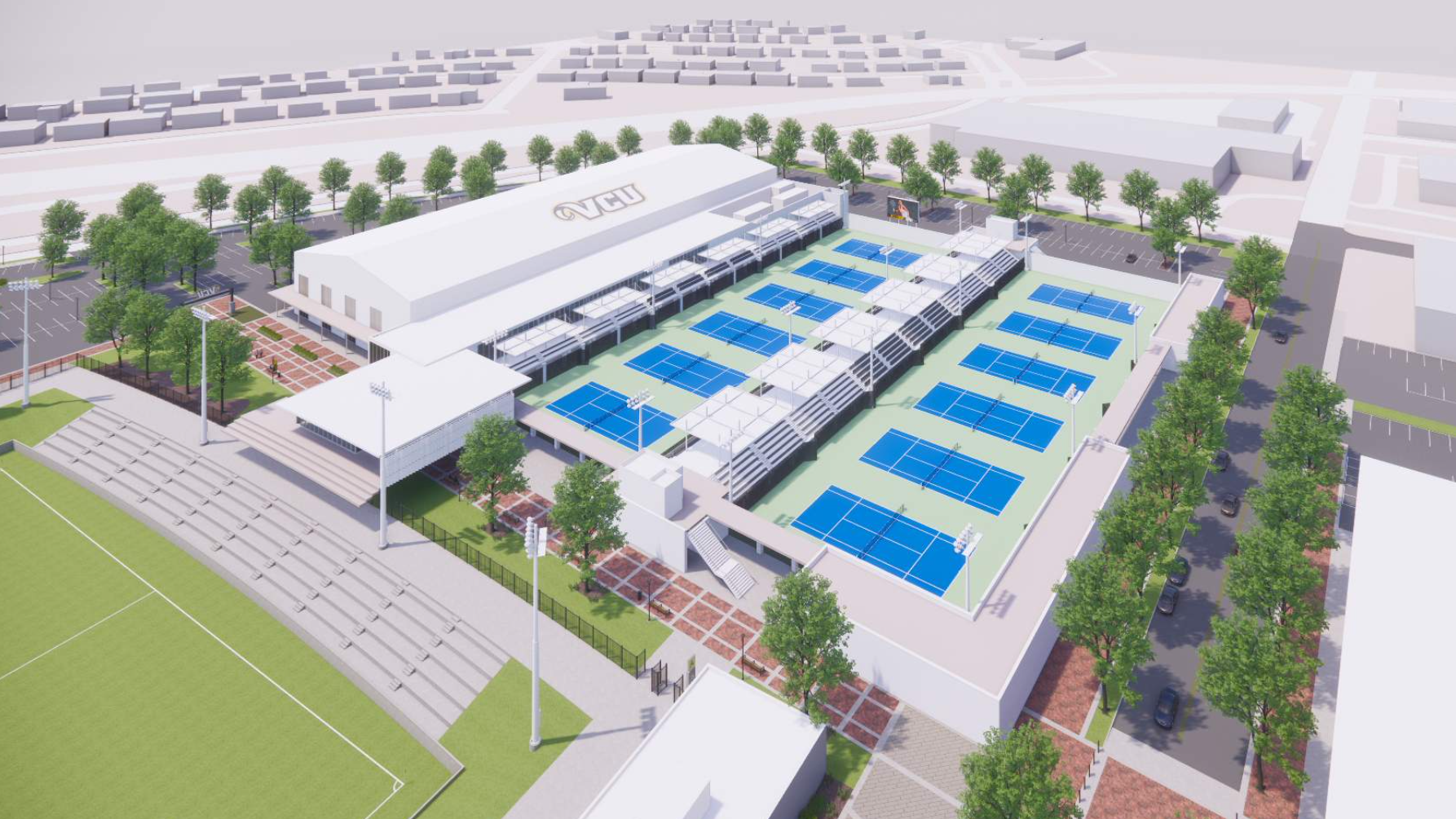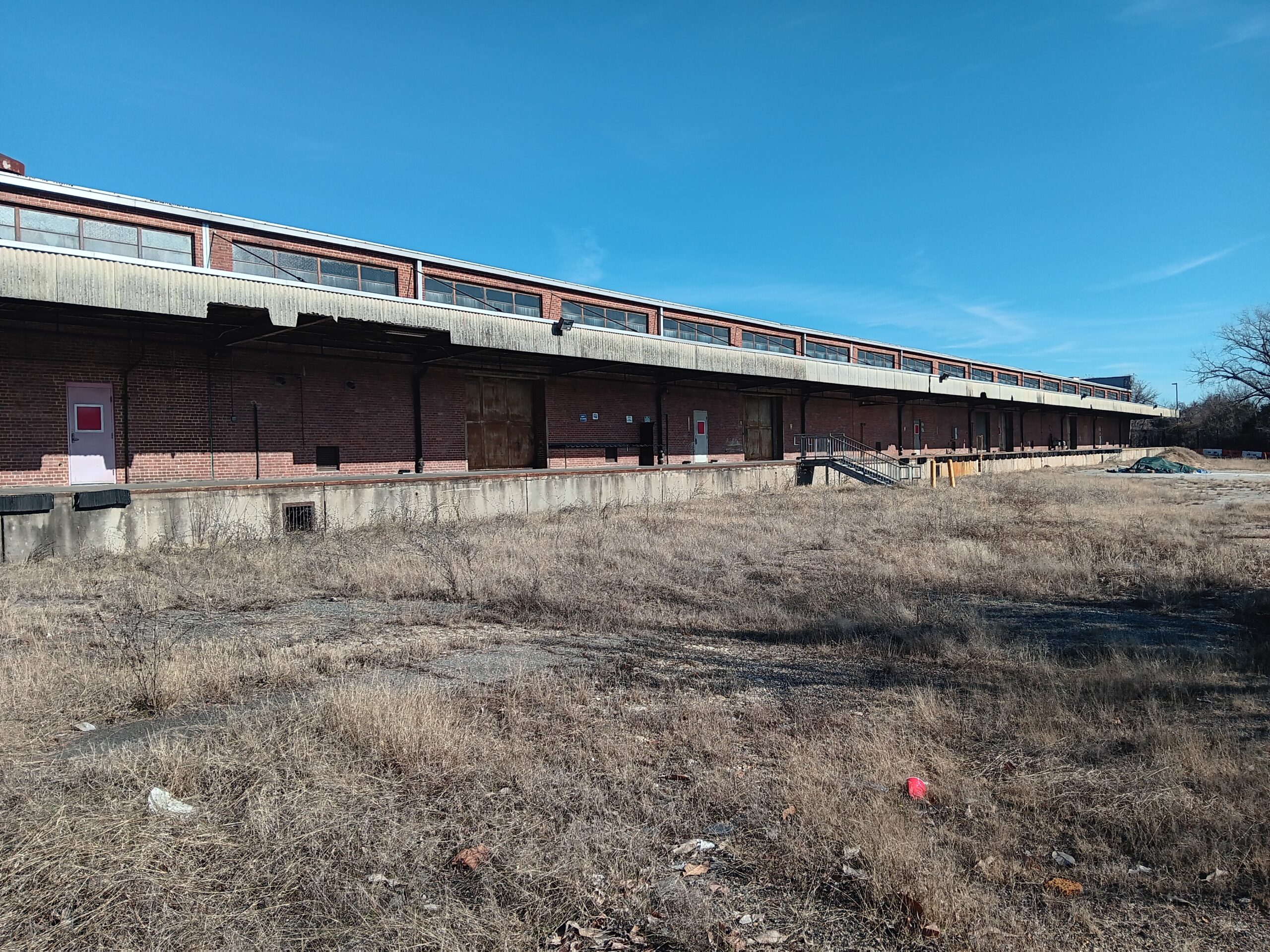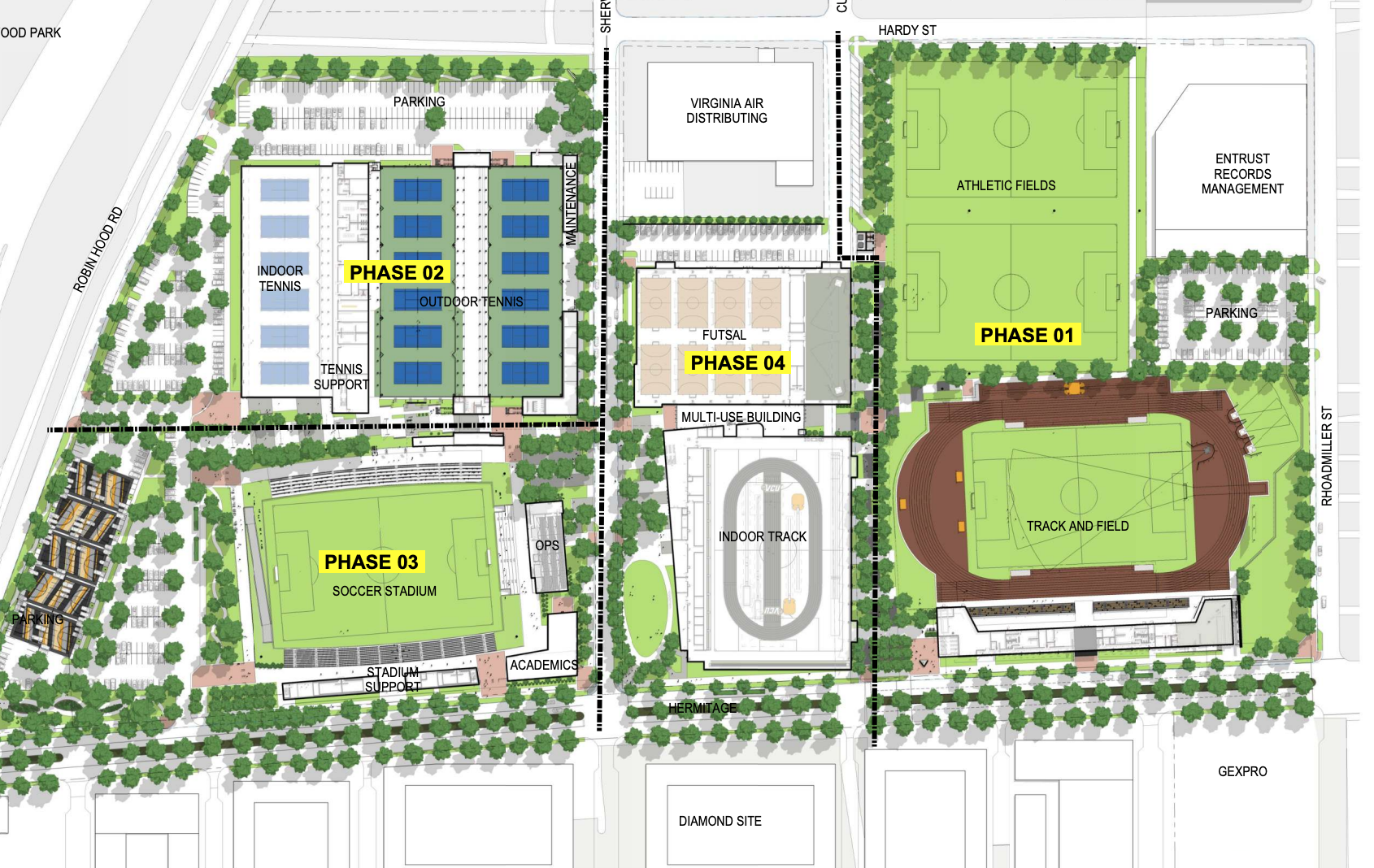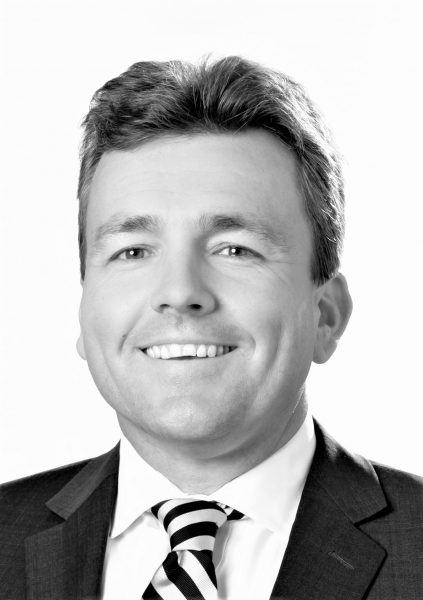
A conceptual rendering of a tennis center that’s set to be the second phase of the VCU’s Athletic Village. (BizSense file photo)
VCU is getting set to begin the first leg of visible work on what it’s calling its third campus in the city.
Athletics Director Ed McLaughlin said this month that he expects demolition to begin by the spring on the 42 acres that will eventually house the school’s “Athletic Village” at 2601-2901 Hermitage Road.
The development would be a major hub for many of VCU’s sports teams with new athletics fields, an indoor/outdoor tennis facility, a soccer stadium, futsal courts and more.
The Athletic Village is set to replace a number of aging warehouses on the properties, including the former Virginia Alcoholic Beverage Control Authority headquarters at 2901 Hermitage Road and the former Greyhound bus maintenance facility at 2701 Hermitage Road.
“When folks drive down Hermitage Road come March and April… they’ll see some fences up and they’ll see some signs up for what’s coming,” McLaughlin said. “They’ll see a whole bunch of big machines moving buildings and dirt. It’s going to be exciting.”
In planning documents, VCU says that the development would “establish a third campus” for the university.
VCU began purchasing the land it needed for the Athletic Village in 2020, a process it concluded in 2022 with the ABC deal. In total it spent $39 million for nearly 42 acres.
The phased project is expected to be built generally starting from the south end of the assemblage moving north. Other than building permits, McLaughlin said the project doesn’t need any sort of city zoning or entitlement approvals to move forward.
McLaughlin said the southernmost parcels, including the Greyhound facility and a former Salvation Army center, are planned to be developed first. A pair of fields and a track and field center are planned to rise on that 15-acre plot.
“The practice fields will be the first (phase) because our teams don’t have practice fields right now. So that’s priority number one,” McLaughlin said.
Due to its status as a state body, VCU has to issue public request-for-proposals for the various demolition, design and general contracting duties for its projects. McLaughlin said that, to date, it has only bid out the demolition contract for the first phase of the Athletic Village.
Following that phase, the vacant, 365,000-square-foot former ABC headquarters would be demolished to make way for a dozen outdoor and six indoor tennis courts and a soccer stadium.
VCU is also pondering putting an academic building on part of the 20-acre ABC site, though nothing has been finalized. McLaughlin said such a building could potentially house VCU’s sports leadership graduate program, as it would make sense for such a program to be near the athletics cluster.
The fourth and final phase would be a multi-use building with an indoor track and eight futsal courts on a 6-acre property at 1609 Sherwood Ave.
Other than the practice fields, McLaughlin said much of the Athletic Village would be available for public use, including the tennis facilities.
“We want these facilities to be busy 350 days a year and have them be really highly useful for our community,” he said.

The former Greyhound maintenance facility is set to be one of the first structures to be knocked down to make way for the Athletic Village. (Mike Platania photo)
VCU is tangentially involved with the massive Diamond District redevelopment across the street, primarily due to plans for its baseball team to share the new ballpark with the Flying Squirrels.
The university also has a hand in the 6.6-acre Sports Backers Stadium property, which abuts The Diamond at 100 Avenue of Champions and is planned to be razed as part of the Diamond District project.
VCU is planning to sell the stadium to the city as part of the overall Diamond District development deal, though it’s unclear when that sale will close. McLaughlin said he can’t comment on where things stand with that part of the process, “other than to say we’re still working with the city on various aspects of the project.”
A spokesperson for Mayor Levar Stoney said in a statement that the city is committed to working with VCU on the eventual replacement of Sports Backers Stadium, “but the exact timing of when that replacement will be necessary is still to be determined.”
“The city’s top priority in the Diamond District is delivering a new top-quality stadium for the Richmond Flying Squirrels and VCU Rams Baseball,” the statement continued.
McLaughlin added that the timing of the pending sale of Sports Backers Stadium won’t impact the Athletic Village’s construction.
“We’re moving forward on what we’re doing,” McLaughlin said. “The momentum that we have is great, so we’re not stopping.”
Sports Backers, the nonprofit that puts on big Richmond events like the Monument Avenue 10K, is also currently based out of its namesake stadium, and is preparing to relocate its offices to the Lakeside area of Henrico near a trailhead for the forthcoming Fall Line Trail.
A concrete timeline on the overall Diamond District project is less imminent. Final agreements have yet to be reached on the ballpark design and the city still needs to formally establish a community development authority that would issue bonds for the project.
McLaughlin said he’s looking forward to seeing further progress on the Diamond District negotiations, in conjunction with momentum on the Athletic Village.
“Hopefully we’ll all have ballpark agreements done soon and have some clarity on the Diamond District too,” he said. “I think both sides of Hermitage Road will help each other be successful.”
The total cost of the Athletic Village hasn’t been finalized. McLaughlin said a large portion of the project will be paid for by athletics department fundraising.
“Whether it’s private philanthropy, foundations or corporate support, there’s multiple sources,” he said. “But those three buckets will be the primary drivers of it.”
He said the first phase has been funded and that they’re now working on fundraising for the second phase of the project.
McLaughlin said they began talking about the Athletic Village not long after he arrived in Richmond in 2012. He said planning efforts got underway in earnest in 2016, and that once work begins, he’s hoping the entire campus could be completed in six or seven years.
“There’s a lot of moving pieces with it all the time, and a lot of things we need to get finalized as we go forward, but we’re certainly excited about it,” he said.
“These large, aggressive projects take a long time to come to fruition and having some of the politics that are involved at local and state level made it complicated the last few years. It’s something we’ve worked on a long time and I’m going to be very happy when we start moving dirt this spring.”

A conceptual rendering of a tennis center that’s set to be the second phase of the VCU’s Athletic Village. (BizSense file photo)
VCU is getting set to begin the first leg of visible work on what it’s calling its third campus in the city.
Athletics Director Ed McLaughlin said this month that he expects demolition to begin by the spring on the 42 acres that will eventually house the school’s “Athletic Village” at 2601-2901 Hermitage Road.
The development would be a major hub for many of VCU’s sports teams with new athletics fields, an indoor/outdoor tennis facility, a soccer stadium, futsal courts and more.
The Athletic Village is set to replace a number of aging warehouses on the properties, including the former Virginia Alcoholic Beverage Control Authority headquarters at 2901 Hermitage Road and the former Greyhound bus maintenance facility at 2701 Hermitage Road.
“When folks drive down Hermitage Road come March and April… they’ll see some fences up and they’ll see some signs up for what’s coming,” McLaughlin said. “They’ll see a whole bunch of big machines moving buildings and dirt. It’s going to be exciting.”
In planning documents, VCU says that the development would “establish a third campus” for the university.
VCU began purchasing the land it needed for the Athletic Village in 2020, a process it concluded in 2022 with the ABC deal. In total it spent $39 million for nearly 42 acres.
The phased project is expected to be built generally starting from the south end of the assemblage moving north. Other than building permits, McLaughlin said the project doesn’t need any sort of city zoning or entitlement approvals to move forward.
McLaughlin said the southernmost parcels, including the Greyhound facility and a former Salvation Army center, are planned to be developed first. A pair of fields and a track and field center are planned to rise on that 15-acre plot.
“The practice fields will be the first (phase) because our teams don’t have practice fields right now. So that’s priority number one,” McLaughlin said.
Due to its status as a state body, VCU has to issue public request-for-proposals for the various demolition, design and general contracting duties for its projects. McLaughlin said that, to date, it has only bid out the demolition contract for the first phase of the Athletic Village.
Following that phase, the vacant, 365,000-square-foot former ABC headquarters would be demolished to make way for a dozen outdoor and six indoor tennis courts and a soccer stadium.
VCU is also pondering putting an academic building on part of the 20-acre ABC site, though nothing has been finalized. McLaughlin said such a building could potentially house VCU’s sports leadership graduate program, as it would make sense for such a program to be near the athletics cluster.
The fourth and final phase would be a multi-use building with an indoor track and eight futsal courts on a 6-acre property at 1609 Sherwood Ave.
Other than the practice fields, McLaughlin said much of the Athletic Village would be available for public use, including the tennis facilities.
“We want these facilities to be busy 350 days a year and have them be really highly useful for our community,” he said.

The former Greyhound maintenance facility is set to be one of the first structures to be knocked down to make way for the Athletic Village. (Mike Platania photo)
VCU is tangentially involved with the massive Diamond District redevelopment across the street, primarily due to plans for its baseball team to share the new ballpark with the Flying Squirrels.
The university also has a hand in the 6.6-acre Sports Backers Stadium property, which abuts The Diamond at 100 Avenue of Champions and is planned to be razed as part of the Diamond District project.
VCU is planning to sell the stadium to the city as part of the overall Diamond District development deal, though it’s unclear when that sale will close. McLaughlin said he can’t comment on where things stand with that part of the process, “other than to say we’re still working with the city on various aspects of the project.”
A spokesperson for Mayor Levar Stoney said in a statement that the city is committed to working with VCU on the eventual replacement of Sports Backers Stadium, “but the exact timing of when that replacement will be necessary is still to be determined.”
“The city’s top priority in the Diamond District is delivering a new top-quality stadium for the Richmond Flying Squirrels and VCU Rams Baseball,” the statement continued.
McLaughlin added that the timing of the pending sale of Sports Backers Stadium won’t impact the Athletic Village’s construction.
“We’re moving forward on what we’re doing,” McLaughlin said. “The momentum that we have is great, so we’re not stopping.”
Sports Backers, the nonprofit that puts on big Richmond events like the Monument Avenue 10K, is also currently based out of its namesake stadium, and is preparing to relocate its offices to the Lakeside area of Henrico near a trailhead for the forthcoming Fall Line Trail.
A concrete timeline on the overall Diamond District project is less imminent. Final agreements have yet to be reached on the ballpark design and the city still needs to formally establish a community development authority that would issue bonds for the project.
McLaughlin said he’s looking forward to seeing further progress on the Diamond District negotiations, in conjunction with momentum on the Athletic Village.
“Hopefully we’ll all have ballpark agreements done soon and have some clarity on the Diamond District too,” he said. “I think both sides of Hermitage Road will help each other be successful.”
The total cost of the Athletic Village hasn’t been finalized. McLaughlin said a large portion of the project will be paid for by athletics department fundraising.
“Whether it’s private philanthropy, foundations or corporate support, there’s multiple sources,” he said. “But those three buckets will be the primary drivers of it.”
He said the first phase has been funded and that they’re now working on fundraising for the second phase of the project.
McLaughlin said they began talking about the Athletic Village not long after he arrived in Richmond in 2012. He said planning efforts got underway in earnest in 2016, and that once work begins, he’s hoping the entire campus could be completed in six or seven years.
“There’s a lot of moving pieces with it all the time, and a lot of things we need to get finalized as we go forward, but we’re certainly excited about it,” he said.
“These large, aggressive projects take a long time to come to fruition and having some of the politics that are involved at local and state level made it complicated the last few years. It’s something we’ve worked on a long time and I’m going to be very happy when we start moving dirt this spring.”


I am a little confused here. Here is the article that ran in the Times Dispatch 2 weeks ago. Richmond adjusts plans for ballpark, Sports Backers Stadium TheRTD article stated, “In an effort to lower costs, the city will defer $25 million owed to Virginia Commonwealth University. The move is designed to get the baseball stadium across the finish line, as the city quickly approaches a 2026 deadline. But the delay freezes VCU’s ability to build an athletics village on the other side of Hermitage Road.”
yeah, this was timed at the exact same time they announced they were buying Mayo Island too, which i thought was kind of a slap in the face to VCU.
Wow, can a University own a City?
Demolition is only one phase of the work. It appears that VCU wants to be prepared to move forward, unlike the City of Richmond which is taking forever to get the ball rolling for the new stadium.
And as usual no indoor or outdoor Basketball Courts.
they already have a basketball development facility.
There also appear to be basketball courts in the far Northwest corner, on the parking lots (I assume overflow parking?).
They already have the BBall development center, as well as their own Rec center/gym for students, and the Seigel Center. That would be overkill. VCU doesn’t need more basketball space.
“When folks drive down Hermitage Road come March and April… they’ll see some fences up and they’ll see some signs up for what’s coming,” McLaughlin said. “They’ll see a whole bunch of big machines moving buildings and dirt. It’s going to be exciting.” …and when we’re done, all of the thousands of non-student residents from the Diamond District, Sherwood Park, Newtowne, Carver, Rosedale, Scott’s Addition, Laburnum Park, Virginia Union, Brookland Park, Barton Heights, Ginter Park, the Fan, and Bellevue will see a whole bunch of new fences keeping everyone but VCU students and ticketholders from accessing the area. It’ll be… Read more »
Maybe don’t live in a college town if you don’t want to see college facilities.
I live in a city – with colleges – some of which seem to have no concept of where their campus begins or ends.
These jokesters and their projects in this town bound to amaze me.I will say it makes very entertaining reading lol.
Will VCU be paying any taxes on this property? Warehouses and businesses provide the city tax revenue. To my knowledge, VCU owned property does not.
Please correct me if I’m wrong, but fiscal moves like this worry me.
No, the state will not be paying taxes to itself. But run down and empty warehouse aren’t doing the city any favors. I invite you all to look at what RVA was like BEFORE VCU started making the improvements it has over the past 25(ish) years, then get back to us.